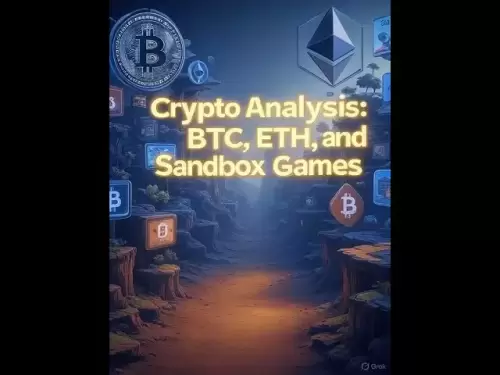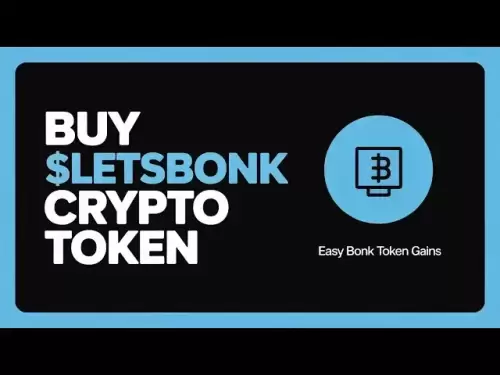-
 Bitcoin
Bitcoin $118100
-0.44% -
 Ethereum
Ethereum $3585
5.43% -
 XRP
XRP $3.434
5.65% -
 Tether USDt
Tether USDt $1.000
0.02% -
 BNB
BNB $743.8
3.89% -
 Solana
Solana $178.7
3.84% -
 USDC
USDC $1.000
0.03% -
 Dogecoin
Dogecoin $0.2381
12.81% -
 TRON
TRON $0.3270
3.62% -
 Cardano
Cardano $0.8315
4.93% -
 Hyperliquid
Hyperliquid $44.51
-4.42% -
 Stellar
Stellar $0.4710
1.52% -
 Sui
Sui $3.896
-2.51% -
 Chainlink
Chainlink $18.09
6.98% -
 Hedera
Hedera $0.2681
9.31% -
 Bitcoin Cash
Bitcoin Cash $516.7
4.83% -
 Avalanche
Avalanche $23.95
6.96% -
 Shiba Inu
Shiba Inu $0.00001490
5.67% -
 UNUS SED LEO
UNUS SED LEO $8.966
0.80% -
 Toncoin
Toncoin $3.294
4.39% -
 Litecoin
Litecoin $105.4
4.69% -
 Polkadot
Polkadot $4.356
5.30% -
 Uniswap
Uniswap $10.29
17.25% -
 Monero
Monero $327.9
-3.04% -
 Bitget Token
Bitget Token $4.942
4.33% -
 Ethena USDe
Ethena USDe $1.001
0.08% -
 Pepe
Pepe $0.00001348
2.17% -
 Dai
Dai $1.000
0.02% -
 Aave
Aave $320.8
0.58% -
 Bittensor
Bittensor $411.8
-4.07%
Do I actually own Bitcoin when I buy an ETF?
When you buy a Bitcoin ETF, you typically don’t own actual Bitcoin but shares that track its price through futures or physical reserves held by the fund.
Jul 13, 2025 at 10:01 pm
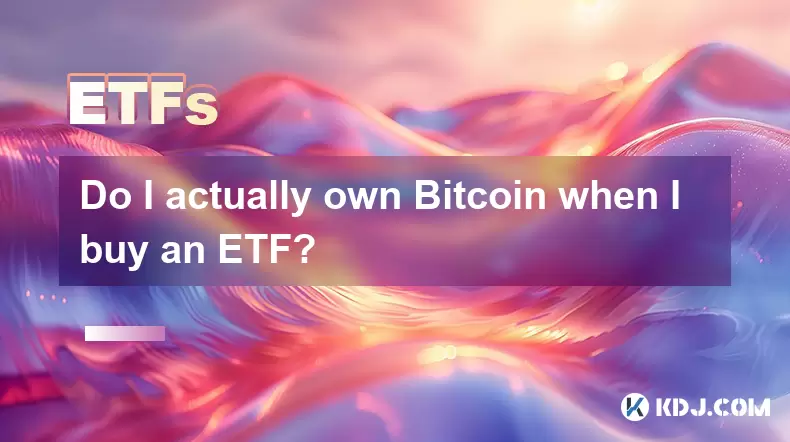
Understanding Bitcoin ETFs and Ownership
When you purchase a Bitcoin Exchange-Traded Fund (ETF), the question of whether you actually own Bitcoin arises frequently. The answer depends on the structure of the specific ETF you are investing in. In most cases, you do not directly own Bitcoin when buying shares in a Bitcoin ETF. Instead, you own shares that represent exposure to Bitcoin's price movements without holding the actual cryptocurrency.
Some ETFs are designed to track the price of Bitcoin through futures contracts or other financial instruments. These funds do not hold physical Bitcoin but instead mirror its performance using derivatives. Other ETFs, particularly physically-backed ones, do hold actual Bitcoin as reserves. Even then, however, the ownership of Bitcoin remains with the fund, and investors only have claims against the fund itself.
Physical vs. Futures-Based Bitcoin ETFs
There are two main types of Bitcoin ETFs: physically-backed and futures-based. Understanding the difference is crucial for determining whether you truly own Bitcoin.
- Physically-backed ETFs store real Bitcoin in secure wallets. When you invest in this type of ETF, your money goes toward purchasing actual BTC, which is held by a custodian on behalf of the fund. Despite this, individual investors do not receive private keys or direct access to the coins.
- Futures-based ETFs use Bitcoin futures contracts traded on regulated exchanges like CME. These contracts derive their value from the expected future price of Bitcoin. No actual Bitcoin is bought or stored, meaning investors have no claim to real coins.
In both cases, your ownership is limited to fund shares rather than digital assets.
How Investor Claims Work in Bitcoin ETFs
Investors in Bitcoin ETFs own shares that reflect a portion of the fund’s total assets. If the ETF holds physical Bitcoin, your share entitles you to a proportional amount of BTC held in custody. However, this entitlement is indirect and subject to the fund’s terms and conditions.
Redemption mechanisms vary across jurisdictions and fund structures. Some institutional investors can redeem large blocks of ETF shares for actual Bitcoin, but retail investors typically cannot. This means that while the fund may hold Bitcoin, individual shareholders cannot take delivery of it unless specified under certain redemption rules.
Furthermore, the presence of custodians and third-party administrators introduces counterparty risk. If the custodian fails or mismanages the assets, your claim could be compromised, even if the fund is backed by real Bitcoin.
Tax Implications and Reporting Requirements
From a tax perspective, owning a Bitcoin ETF is generally treated similarly to owning any other stock or fund. You are not taxed on the underlying asset directly, but rather on capital gains realized when selling your ETF shares.
In contrast, owning actual Bitcoin involves reporting every transaction involving transfers, trades, or spending. With an ETF, tax reporting becomes simpler, as you don’t need to track individual crypto transactions.
However, some jurisdictions may treat physically-backed ETFs differently. For instance, in countries where cryptocurrencies are classified as property, ETF holdings might still require disclosure or trigger different tax treatments. Always consult a tax professional familiar with cryptocurrency regulations in your region before making investment decisions.
Security and Custody Risks in Bitcoin ETFs
One of the primary attractions of owning Bitcoin directly is the ability to self-custody and avoid reliance on third parties. When you buy a Bitcoin ETF, you place trust in the fund provider and custodian to manage the assets securely.
Even though reputable ETF providers often partner with established custodians, risks remain. Cyberattacks, internal fraud, regulatory actions, or operational failures can impact the fund’s holdings. Unlike personal wallets where you control the keys, ETF investors have no recourse to recover lost assets beyond what the fund offers.
Additionally, ETFs may charge management fees that eat into returns over time. These fees cover custody, administration, and compliance costs. While convenient, they reduce the net exposure to Bitcoin compared to direct ownership.
FAQs About Bitcoin ETFs and Ownership
What happens to my Bitcoin if the ETF provider goes bankrupt?
If the ETF issuer becomes insolvent, your investment may be affected depending on how the assets are structured. Physically-backed ETFs typically hold assets separately from the fund manager, offering some protection. However, there is always risk associated with third-party custodianship, and recovery is not guaranteed.
Can I convert my ETF shares into actual Bitcoin?
Generally, retail investors cannot exchange ETF shares for physical Bitcoin. Only authorized participants, usually large institutions, can redeem shares for underlying assets in specific circumstances defined by the fund.
Are Bitcoin ETFs regulated like traditional ETFs?
Yes, Bitcoin ETFs fall under the same regulatory frameworks as traditional ETFs in most jurisdictions. However, because they involve cryptocurrency, they may face additional scrutiny from regulators regarding valuation, custody, and investor protections.
Is there a way to verify if an ETF actually holds Bitcoin?
Many ETF providers publish daily reports showing their holdings. You can check these disclosures to confirm whether the fund is physically-backed. Still, independent verification is limited, and investors must rely on the fund’s transparency and reputation.
Disclaimer:info@kdj.com
The information provided is not trading advice. kdj.com does not assume any responsibility for any investments made based on the information provided in this article. Cryptocurrencies are highly volatile and it is highly recommended that you invest with caution after thorough research!
If you believe that the content used on this website infringes your copyright, please contact us immediately (info@kdj.com) and we will delete it promptly.
- Coinbase (COIN) Soars to All-Time High: What's Next?
- 2025-07-19 00:30:12
- DOGE, BlockDAG, and Vesting: What's Hot and What's Not in Crypto Right Now
- 2025-07-19 01:10:14
- Crypto Coins with 2025 Potential: BlockDAG and SUI Lead the Charge
- 2025-07-19 01:15:12
- Grass Cutting Hacks: Finding the Right Height for a Lush Lawn
- 2025-07-19 00:30:12
- RWA Token Revolution: Stage Point Europe Leads Crypto Real Estate Launch in Europe
- 2025-07-19 00:50:13
- Token Unlocks and AVAIL: July's Crypto Cliffhangers!
- 2025-07-19 00:50:13
Related knowledge
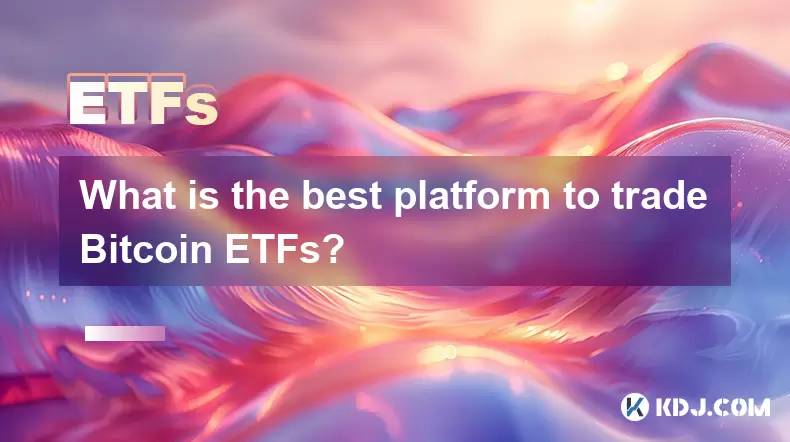
What is the best platform to trade Bitcoin ETFs?
Jul 17,2025 at 03:50pm
Understanding Bitcoin ETFs and Their Role in the MarketBitcoin Exchange-Traded Funds (ETFs) are investment vehicles that track the price of Bitcoin wi...
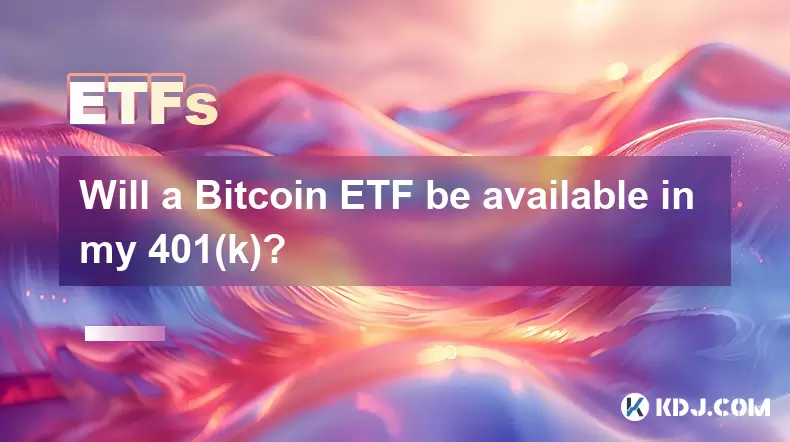
Will a Bitcoin ETF be available in my 401(k)?
Jul 17,2025 at 10:42pm
What is a Bitcoin ETF?A Bitcoin ETF (Exchange-Traded Fund) is an investment vehicle that tracks the price of Bitcoin without requiring investors to di...
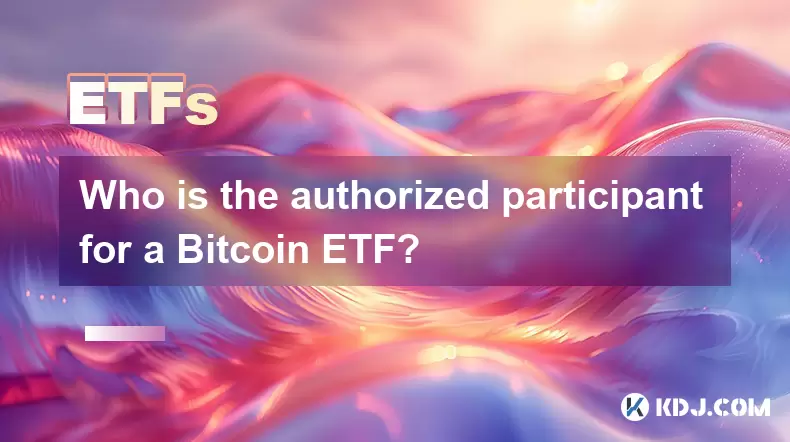
Who is the authorized participant for a Bitcoin ETF?
Jul 18,2025 at 12:42am
Understanding the Role of Authorized Participants in Bitcoin ETFsIn the context of Bitcoin Exchange-Traded Funds (ETFs), an authorized participant (AP...
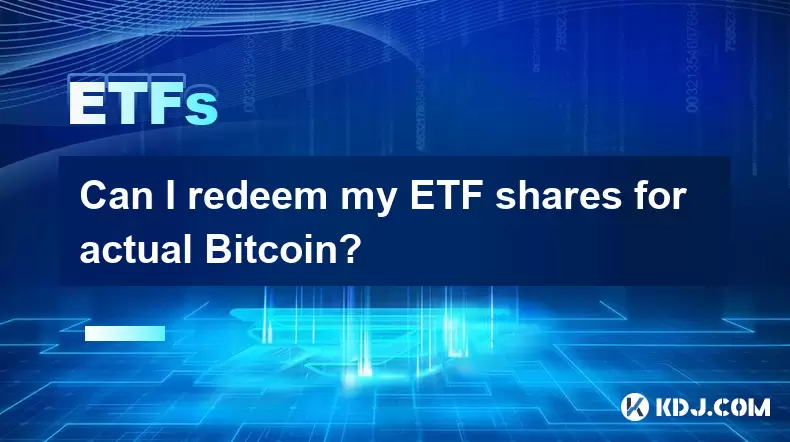
Can I redeem my ETF shares for actual Bitcoin?
Jul 17,2025 at 03:14pm
Understanding ETF Shares and Their Relation to BitcoinExchange-Traded Funds (ETFs) have become a popular investment vehicle for those looking to gain ...
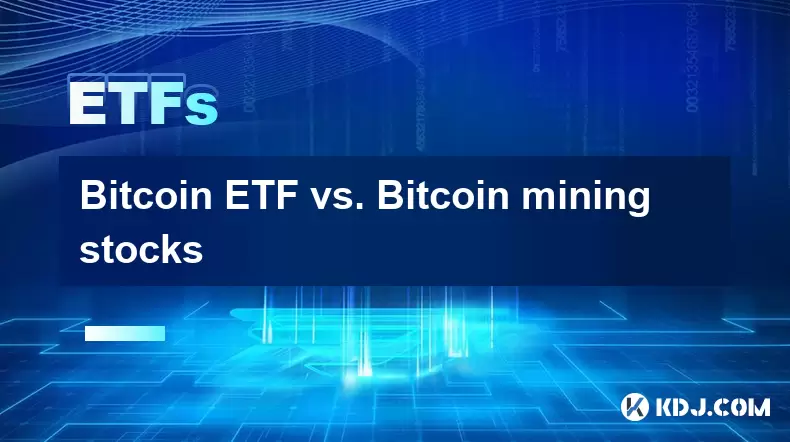
Bitcoin ETF vs. Bitcoin mining stocks
Jul 18,2025 at 04:08pm
What is a Bitcoin ETF?A Bitcoin Exchange-Traded Fund (ETF) is an investment vehicle that tracks the price of Bitcoin and trades on traditional stock e...
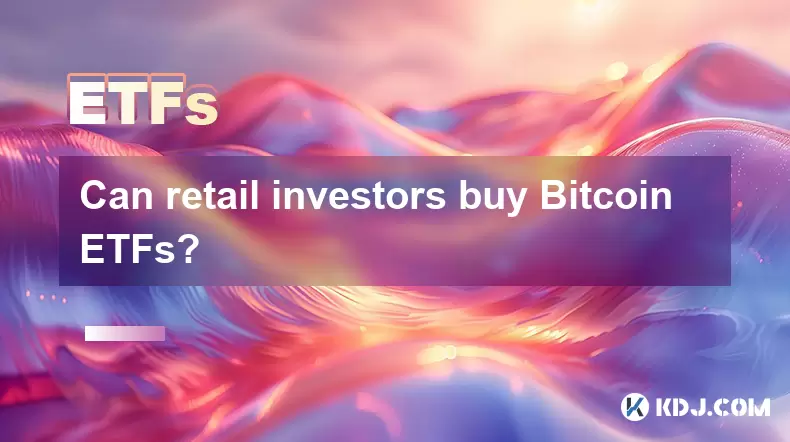
Can retail investors buy Bitcoin ETFs?
Jul 17,2025 at 12:50pm
What is a Bitcoin ETF?A Bitcoin Exchange-Traded Fund (ETF) is an investment vehicle that tracks the price of Bitcoin and trades on traditional stock e...

What is the best platform to trade Bitcoin ETFs?
Jul 17,2025 at 03:50pm
Understanding Bitcoin ETFs and Their Role in the MarketBitcoin Exchange-Traded Funds (ETFs) are investment vehicles that track the price of Bitcoin wi...

Will a Bitcoin ETF be available in my 401(k)?
Jul 17,2025 at 10:42pm
What is a Bitcoin ETF?A Bitcoin ETF (Exchange-Traded Fund) is an investment vehicle that tracks the price of Bitcoin without requiring investors to di...

Who is the authorized participant for a Bitcoin ETF?
Jul 18,2025 at 12:42am
Understanding the Role of Authorized Participants in Bitcoin ETFsIn the context of Bitcoin Exchange-Traded Funds (ETFs), an authorized participant (AP...

Can I redeem my ETF shares for actual Bitcoin?
Jul 17,2025 at 03:14pm
Understanding ETF Shares and Their Relation to BitcoinExchange-Traded Funds (ETFs) have become a popular investment vehicle for those looking to gain ...

Bitcoin ETF vs. Bitcoin mining stocks
Jul 18,2025 at 04:08pm
What is a Bitcoin ETF?A Bitcoin Exchange-Traded Fund (ETF) is an investment vehicle that tracks the price of Bitcoin and trades on traditional stock e...

Can retail investors buy Bitcoin ETFs?
Jul 17,2025 at 12:50pm
What is a Bitcoin ETF?A Bitcoin Exchange-Traded Fund (ETF) is an investment vehicle that tracks the price of Bitcoin and trades on traditional stock e...
See all articles
























